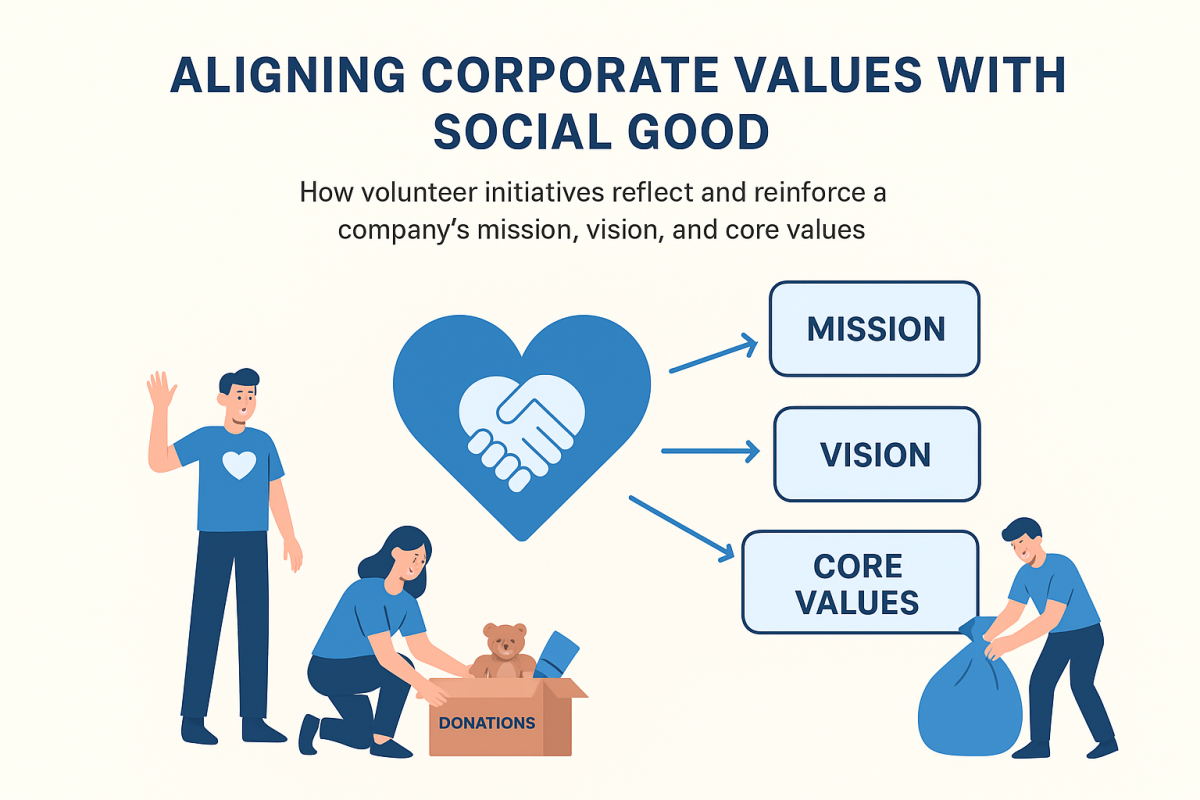A Culture of Kindness: Strengthening Workplace Morale
September 23, 2025A Culture of Kindness: Strengthening Workplace Morale
September 23, 2025
In an era where corporate responsibility transcends profit margins, aligning volunteer initiatives with a company’s mission, vision, and core values has become paramount. This strategic alignment not only enhances brand reputation but also fosters a culture of purpose-driven engagement among employees. This article delves into how volunteer programs can serve as a conduit for reflecting and reinforcing a company’s foundational principles.
Understanding Corporate Mission, Vision, and Core Values
- Mission: The mission statement articulates the company’s purpose and the reason for its existence. It defines the organization’s primary objectives and serves as a guide for decision-making.
- Vision: The vision statement outlines the desired future position of the company. It provides a clear picture of what the organization aspires to achieve in the long term.
- Core Values: Core values are the fundamental beliefs and guiding principles that dictate behavior and action within the organization. They shape the corporate culture and influence how employees interact with each other and with external stakeholders.
The Role of Volunteer Initiatives in Reflecting Corporate Principles
Volunteer programs offer a tangible means for companies to demonstrate their commitment to social responsibility. By engaging in community service, organizations can:
- Exemplify Core Values: Participation in volunteer activities allows companies to showcase values such as integrity, empathy, and collaboration in action.
- Enhance Brand Reputation: Active involvement in community welfare projects can improve public perception and strengthen brand loyalty.
- Foster Employee Engagement: Providing employees with opportunities to contribute to societal causes can increase job satisfaction and retention rates.
Strategic Alignment of Volunteer Programs with Organizational Objectives
To ensure that volunteer initiatives effectively reflect and reinforce corporate values, companies should:
- Identify Relevant Causes: Select community projects that align with the company’s mission and values. For instance, a technology firm might support digital literacy programs.
- Encourage Employee Participation: Create a culture that encourages employees to volunteer by offering flexible hours, recognition, and incentives.
- Measure Impact: Establish metrics to assess the effectiveness of volunteer programs in achieving both community and organizational goals.
- Communicate Efforts: Regularly share the outcomes of volunteer initiatives with stakeholders to highlight the company’s commitment to social good.
Benefits of Aligning Volunteer Initiatives with Corporate Values
Aligning volunteer programs with corporate principles yields several benefits:
- Strengthened Corporate Culture: Employees who engage in meaningful volunteer work often experience increased morale and a sense of purpose.
- Improved Stakeholder Relationships: Demonstrating a commitment to social responsibility can enhance relationships with customers, investors, and the community.
- Attraction of Talent: Companies known for their philanthropic efforts are more likely to attract individuals who share similar values.
Case Studies
- Microsoft: Through its Employee Giving Program, Microsoft matches employee donations and provides volunteer opportunities, reinforcing its commitment to community empowerment.
- Salesforce: The company offers Volunteer Time Off (VTO), allowing employees to take paid time off to volunteer, thereby integrating social good into its corporate culture.
Conclusion
Aligning volunteer initiatives with a company’s mission, vision, and core values is not merely a philanthropic endeavor but a strategic approach to fostering a purpose-driven organization. By thoughtfully integrating community service into corporate practices, companies can enhance their brand, engage employees, and contribute positively to society.
xcm



